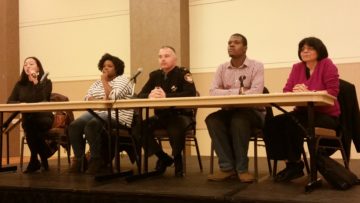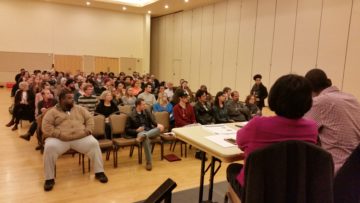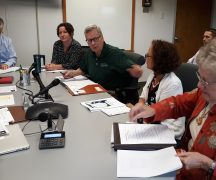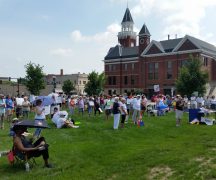By JAN LARSON McLAUGHLIN
BG Independent News
A roomful of students and faculty asked Wood County Sheriff Mark Wasylyshyn Wednesday evening to deliver some messages to President-elect Donald Trump.
Public policy should not be based on hatred and fear. Immigrants are not the problem. And African Americans are tired of mourning their dead then being asked by law enforcement to move on.
Wasylyshyn, who is acting as a law enforcement liaison with the Trump administration, was asked to meet students and others who had concerns about the direction of the new administration. He was joined on a panel by faculty who presented brief lessons on the values of immigrants, the history of violence against African Americans, and the higher arrest rates for African Americans.
Wasylyshyn, who was just re-elected to his fourth term as sheriff, said he suspected he was selected by the National Sheriffs Association to serve as liaison because of Ohio’s swing state status. He is also the incoming president of the Buckeye Sheriffs Association.
He set the stage by explaining his philosophy for his office. “I truly look at us as public servants. I serve the public.”

Panel at Wednesday forum at BGSU
The key concerns shared so far during conference calls about the presidential transition effort have been mental health and opiate issues. Local jails have taken over where mental institutions left off, the sheriff said.
“We have become the mental hospitals,” often when people stop taking their medications, he said. “We’re a revolving door. We’re saying a jail is not the right place.”
The same is occurring with heroin and other opiates, with jails becoming detox centers. “We’re not designed for that.”
Wasylyshyn wants to get those messages to the Trump team.
But members of the BGSU audience wanted to send some different messages as well. They asked why law enforcement is more likely to give a white suspect the benefit of the doubt about mental health issues, but if the suspect is of color, law enforcement is more likely to jump to the conclusion that he is a thug or terrorist.
Wasylyshyn said the actions of the suspect – not the color – determine the response.
But not all see it that way.
Nicole Jackson, a history professor, said her students desperately want to hear that “things get better” after the Civil Rights Movement. But the reality is not so rosy, she said, listing off name after name of black boys and men killed by law enforcement.
“I’m watching images of people who look like me and my family members being killed,” Jackson said.
Wasylyshyn said he had dash cameras put in all the sheriff’s patrol cars 12 years ago. The deputies were initially against the cameras as intrusion by “Big Brother,” he said. Later, the Wood County Sheriff’s Office was one of the first in the region to get body cameras for officers.
“If I have a deputy who is doing something wrong, is too quick to use force, is being disrespectful, I want to know,” the sheriff said.
A person in the crowd shouted out, asking how racist behavior by officers is handled. Wasylyshyn said the officer could be disciplined, even terminated. “We take that very seriously,” he said.
“We’re not afraid to record what we’re doing,” he said, adding that officers are now trained to assume that the public is videotaping their actions. “That forces everyone to be on their toes.”
But Jackson questioned the perception that body cameras prevent abuse by law enforcement. “I think there’s this idea that cameras will stop that behavior.” However, there is “copious footage of killings” yet few officers are held responsible for their actions, she said.
“What does it matter if there’s a body camera” if it doesn’t result in justice, she asked.
Wasylyshyn said his office requires officers be trained in diversity and community relations, However, he also stressed he could only speak from the perspective of law enforcement here in Wood County. “I don’t have an urban area here in Wood County,” he said, noting that less than 2 percent of the county’s population is African American.

Someone in the audience shouted out that racism can happen anywhere – not just in urban areas.
The rise in white nationalism, which bubbled to the surface with the Trump campaign, was mentioned as a growing problem leading people of color to no longer feel comfortable in their communities.
“This is a place I teach, but this is not a place I feel safe,” Jackson said.
There were also concerns for immigrants, spurred by Trump’s promises to build a wall and deport “illegal immigrants.”
“Immigrants are not the problem. They are the solutions,” to many economic issues, said Vibha Bhalla, and ethnic studies professor who teaches about immigration issues. One person in the audience said a movement has been started to make BGSU and the city of Bowling Green a “sanctuary” campus and community.
Wasylyshyn said he and others in the National Sheriffs Association are in agreement that Trump’s push to arrest illegal immigrants is “impossible to do.”
“Even if President-elect Trump wanted to do that, there’s not enough money,” he said. “There’s not enough jail space.”
Wasylyshyn said his father was an immigrant who came to America at age 28, unable to speak any English. “I’m very sensitive to that.”
An international student said people in America on temporary Visas are fearful of losing their right to be here if they report attacks against them. She also said law enforcement views women wearing hijabs and bearded Muslim men as threats.
“I feel that a lot of officers, their first feeling is fear and to shoot them,” she said.
Wasylyshyn assured that wasn’t the case here, saying he has a close relationship with people at the mosque in Perrysburg Township. He agreed that the “more positive interaction” between groups, the more barriers will be broken down.
“The president elect came in on a promise of constructing a wall and sending people back,” Bhalla said. But places like BGSU are recruiting international students to come here to learn. “We need to make this a welcoming space for them.”
The sheriff was questioned about his previous statement that President Barack Obama should condemn the shooting of police officers and the protests of Trump’s election, but his silence about Trump’s urging his supporters to violence.
“People have the right to protest,” but not cross the line to commit violence, Wasylyshyn said.
“He needs to hear that critique from you,” Jackson said.
“These crimes have increased since the election,” Bhalla said.
Wasylyshyn was also questioned about his support of using surplus military equipment in local law enforcement. He said there are rules governing the use of military vehicles, which can only be used in a defensive manner. The equipment is useful in cases where a person is suspected to be armed.
The meeting ended with far more questions than time to answer them. The sheriff offered to meet again with the group.





